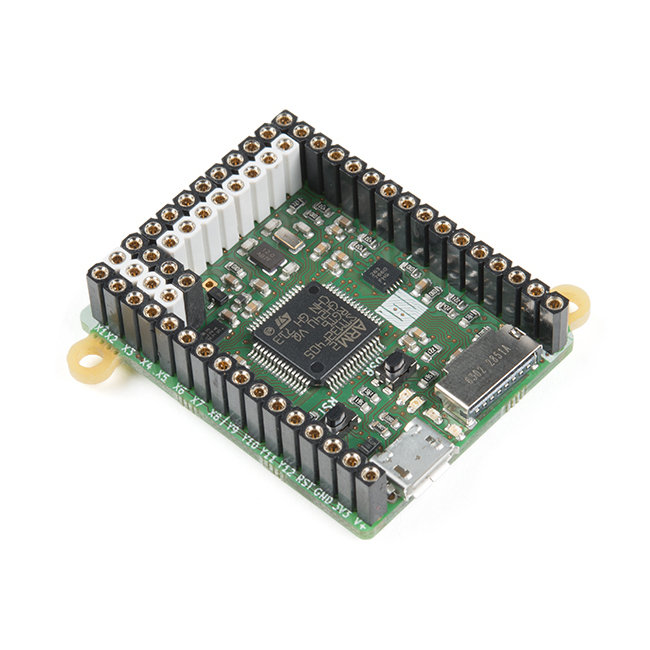MicroPython pyboard v1.1 (with Headers)
The pyboard is a compact and powerful electronics development board that runs MicroPython. It connects to your PC over USB, giving you a USB flash drive on which to save your Python scripts, and a serial Python prompt (a REPL) for instant programming. With the MicroPython pyboard you gain a low-level Python operating system that you are able to use to control plenty of different electronics projects.
This board comes with headers soldered, as in the pictures above. The header pins are the HDR-PD8 product and are female with 56 total positions. These headers are compatible with standard 0.65mm square male pins (Arduino style).
At its heart, the MicroPython pyboard possesses a STM32F405RG microcontroller with a 168 MHz Cortex M4 CPU, 1024KiB flash ROM, and 192KiB of RAM. Each pyboard is also equipped with a microUSB connector for power and serial communications, a microSD card slot, an MMA7660 3-axis accelerometer, 31 GPIO, four LEDs, a reset switch and a user switch. We have two options for the pyboard: one with headers and one without.
MicroPython is a complete rewrite of the Python (version 3.4) programming language so that it fits and runs on a microcontroller. It includes many optimizations so that it runs efficiently and uses very little RAM. Additionally, MicroPython runs bare-metal on the pyboard, and essentially gives you a Python operating system. The built-in pyboard module contains functions and classes to control the peripherals available on the board, such as UART, I2C, SPI, ADC and DAC.
Features:
- STM32F405RG microcontroller
- 168MHz Cortex M4 CPU with hardware floating point
- 1024KiB flash ROM and 192KiB RAM
- MicroUSB connector for power and serial communication
- MicroSD card slot, supporting standard and high-capacity SD cards
- 3-axis accelerometer (MMA7660)
- Real-Time Clock (RTC) with optional battery backup
- 24 GPIO on left and right edges and 5 GPIO on bottom row, plus LED and switch GPIO available on bottom row
- 3x 12-bit analog to digital converters, available on 16 pins, 4 with analog ground shielding
- 2x 12-bit digital to analog (DAC) converters, available on pins X5 and X6
- 4 LEDs (red, green, yellow and blue)
- 1 reset and 1 user switch
- Onboard 3.3V LDO voltage regulator, capable of supplying up to 250mA, input voltage range 3.6V to 16V
- DFU bootloader in ROM for easy upgrading of firmware
Documents:
Videos




